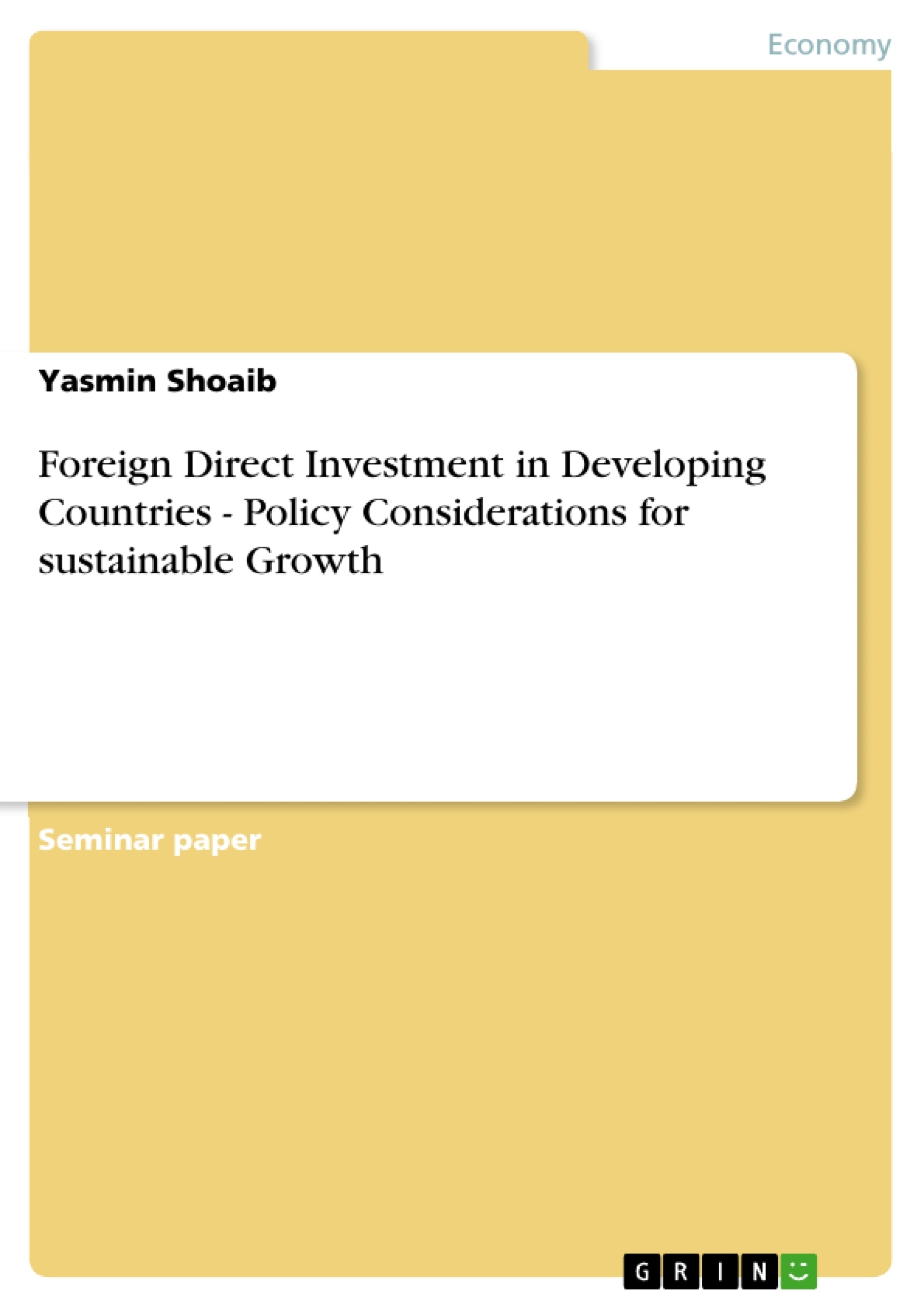Developing countries today have to deal with the question of how to increase economic growth. This phenomenon depends on a variety of factors: political, economic and social ones. Due to globalisation, foreign direct investment (FDI) has become an often discussed issue in literature and is seen as a key factor for economic growth by many developing countries by now. But the effects of FDI are not necessarily positive. In this written assignment, the author would like to introduce policies to be conducted in order to maximise the positive effects and to minimise the negative ones.
This paper will start with a definition of the terms developing country and foreign direct investment. In the second part, a short introduction in the controversial theories about the impact on economies of developing countries will be presented. In the following, several national and international policy considerations will be introduced. The paper will end with a conclusion.
Inhaltsverzeichnis (Table of Contents)
- Introduction
- Definitions
- Developing Countries
- Foreign Direct Investment
- Impact of FDI on Developing Countries
- Theory
- The Benign-Model
- The Malign-Model
- Empirical Evidence
- Theory
- Policies regarding FDI in Developing Countries
- National and International Policies
- Maximising the Positive Effects
- Political Stability and Corruption
- Liberalisation
- Infrastructure
- Human Resources Development
- Export Production Diversification
- Banking System
- Minimising the Negative Effects
- Environment
- International Institutions
- The North-South Equity Divide
- Maximising the Positive Effects
- International Investment Agreements
- National and International Policies
Zielsetzung und Themenschwerpunkte (Objectives and Key Themes)
This paper examines the role of foreign direct investment (FDI) in promoting sustainable growth in developing countries. The author aims to identify and analyze the potential benefits and drawbacks of FDI, focusing on policies that can maximize positive effects and minimize negative ones. The main themes explored in the paper are:- Defining developing countries and foreign direct investment
- The controversial theories surrounding the impact of FDI on developing economies
- Analyzing national and international policies regarding FDI
- Exploring strategies for maximizing the positive effects of FDI, such as improving political stability, promoting liberalization, and investing in infrastructure and human resources
- Investigating measures to mitigate potential negative impacts of FDI, including environmental concerns, international institutions' role, and the North-South equity divide
Zusammenfassung der Kapitel (Chapter Summaries)
- Introduction: The paper introduces the importance of FDI in the context of economic growth in developing countries. It emphasizes the need to understand both the potential benefits and drawbacks of FDI.
- Definitions: This chapter provides detailed definitions of "developing country" and "foreign direct investment," examining the different criteria and perspectives used by various international organizations.
- Impact of FDI on Developing Countries: This chapter delves into the theories and empirical evidence surrounding the impact of FDI on developing economies. It discusses the "Benign-Model" and the "Malign-Model," highlighting the potential positive and negative effects of FDI.
- Policies regarding FDI in Developing Countries: This chapter focuses on national and international policies regarding FDI. It examines strategies for maximizing the positive effects of FDI, such as promoting political stability, liberalization, infrastructure development, human resources development, export production diversification, and a robust banking system. It also discusses measures to minimize negative impacts, including environmental protection, the role of international institutions, and addressing the North-South equity divide.
Schlüsselwörter (Keywords)
The central focus of this paper is on Foreign Direct Investment (FDI) in developing countries and its implications for sustainable growth. Key themes include economic development, globalization, policy considerations, political stability, liberalization, infrastructure development, human resources, environmental concerns, international institutions, and the North-South divide.Frequently Asked Questions
What is the main objective of this paper on FDI?
The paper examines how foreign direct investment (FDI) can promote sustainable growth in developing countries by maximizing positive effects and minimizing negative ones.
What are the "Benign" and "Malign" models of FDI?
These are controversial theories regarding FDI's impact: the Benign-Model highlights potential positive growth, while the Malign-Model focuses on potential negative exploitation or economic disruption.
Which factors can maximize the positive effects of FDI?
Key factors include political stability, reduced corruption, trade liberalization, infrastructure development, and investment in human resources.
What are some potential negative impacts of FDI?
Potential downsides include environmental concerns, the widening of the North-South equity divide, and challenges related to international investment agreements.
Why is human resource development important for FDI?
A skilled workforce is essential for absorbing technology transfers and ensuring that FDI contributes to long-term sustainable economic development.
How does political stability influence FDI?
Political stability reduces risk for foreign investors, making a country more attractive for long-term capital commitments.
- Quote paper
- Yasmin Shoaib (Author), 2006, Foreign Direct Investment in Developing Countries - Policy Considerations for sustainable Growth, Munich, GRIN Verlag, https://www.grin.com/document/63177



